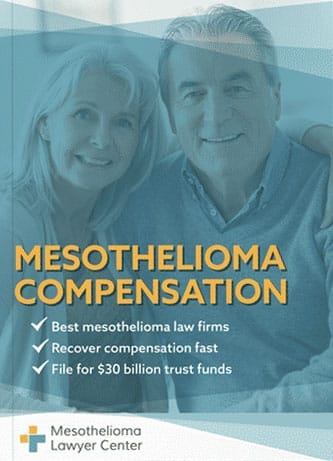Rapid-American Corporation’s predecessor, the Philip Carey Manufacturing Corporation, used asbestos in its insulation and industrial equipment. Lawsuits related to asbestos exposure led to bankruptcy in 2013. Rapid-American created an asbestos trust and now exists solely to compensate claimants.
With more than $30 billion currently set aside in trust funds, you may qualify for substantial compensation if you’ve been diagnosed with mesothelioma, asbestosis, or asbestos-related lung cancer. We invite you to fill out our form today for a free Financial Compensation Packet, filled with information about experienced mesothelioma lawyers in your area, how to get paid in 90 days, how to file an asbestos trust fund claim, and much more.


FREE Financial Compensation Packet
- Info on law firms that will recover your HIGHEST COMPENSATION
- Learn how to get paid in 90 days
- File for your share of $30 billion in trust funds

Did Rapid-American Use Asbestos?
Rapid-American did not use asbestos. It became embroiled in asbestos liabilities because of asbestos use by Philip Carey. Rapid-American was created as a merger that included Philip Carey. It took on its predecessor’s asbestos liabilities.
Philip Carey/Rapid-American History
- Established in 1873 in Cincinnati, Ohio, the Philip Carey Manufacturing Corporation was an insulation company that mined and used asbestos for decades.
- The company’s insulation was used in machinery and products such as boilers, pipes, and generators. It supplied steel mills, refineries, chemical plants, and other industrial workplaces.
- Rapid-American merged with Philip Carey in 1972. Previously, Rapid-American did not use asbestos. It was only the merger with Philip Carey that made it liable for asbestos claims.
- Rapid-American faced its first asbestos lawsuits in the late 1970s.
- Although Rapid-American didn’t manufacture asbestos-containing products, its merger with several companies that did, including Philip Carey, eventually led to bankruptcy.
Philip Carey/Rapid-American Asbestos Products
Rapid-American did not make asbestos products, but Philip Carey did. Philip Carey’s primary type of product was insulation, which at the time was almost always made with asbestos.
Philip Carey was also associated with asbestos through mines. Carey Canada owned asbestos mines in Quebec and supplied the company to make its insulation products.
Philip Carey manufactured numerous asbestos-containing products, including:
- Carey Thermo-Board Concrete
- Carey Rock Wool
- Asbestos Magnesia Diatomite Rock Wool
- Fire-Chex Singles
- Carey Ceramo Glazed Asbestos Siding
- Carey Ceramo Baked-on Ceramic Finish
- Carey Hi-Temp No. 19 (asbestos fiber bonded into commercial pipe insulation)
- Fibrated Emulsion
- Carey Fireclad Jacketing
- Careystone Asbestos Cement Roofing
Who Wast at Risk of Exposure to Philip Carey Asbestos Products?
Philip Carey workers who manufactured asbestos insulation in plants faced high risks of asbestos exposure. By handling and manipulating asbestos and asbestos materials, they were at high risk of inhaling the harmful fibers.
Workers in many other occupations and at other companies were also at risk of exposure to asbestos insulation. These workers handled asbestos products, installed or repaired them, or even worked near them and were at risk of exposure:
- Machinists
- Factory Workers
- Electricians
- Metal Workers
- Insulation Installers and Repairers
- Boilermakers
- Pipefitters
- Plumbers
- Chemical Plant Workers
- Oil Refinery Workers
- Steel Mill Workers
- Textile Mill Workers
- Power Plant Workers
Rapid-American Asbestos Lawsuits
Rapid-American began facing lawsuits over asbestos exposure and illness as early as the 1970s. These are a few notable examples of Rapid-American asbestos lawsuits:
- Henry Pustejovsky developed asbestosis and mesothelioma after a career as a metal worker. He initially sued Johns Manville over asbestosis. When he received a mesothelioma diagnosis, he sued Rapid-American and other suppliers. A judge initially dismissed the case based on the statute of limitations, but the decision was reversed in the Texas Supreme Court. The decision meant he had a legal right to sue again for a second asbestos illness.
- Julius Novicki died from mesothelioma in 1995. He worked as a welder and used asbestos products supplied by several companies. Novicki’s family sued Rapid-American and others for wrongful death in 1997.
- Jesse Domanske made asbestos shingles at a Philip Carey plant. He died from mesothelioma. Domanske’s widow filed a lawsuit, but Rapid-American won summary judgment and had the case dismissed.
Rapid-American Bankruptcy and Asbestos Trust Fund
The accumulation of asbestos-related claims got so high that by 2013, Rapid-American filed for Chapter 11 bankruptcy with more than 275,000 claims against it, equaling over $100 million.
Under 13-10687, U.S. Bankruptcy Court, Southern District of New York (Manhattan), the company listed its assets at $86.9 million and cited asbestos-related claims as the reason for bankruptcy.
“Recently, Rapid has experienced an increase in the number of mesothelioma claims being filed against it and an increase in the dollar amount sought to settle claims,” said Rapid-American Vice President Paul Weiner.
In 2021, Rapid-American put forth a plan to liquidate its assets and establish an asbestos trust fund for claimants. Today, claimants can file with the Rapid-American Asbestos Personal Injury Liquidating Trust.
Seeking Compensation for Exosure to Philip Carey Asbestos Products
If you worked with Rapid-American or Philip Carey products and now have an asbestos illness, talk to a mesothelioma lawyer. They can help you get compensation through the trust.
A lawyer can also review your work history and determine if any other companies could be held liable for your illness. You could be eligible for additional trusts or a lawsuit.
Additional Resources and Help for Asbestos Victims
Remember, if you’ve been diagnosed with an asbestos-related illness, there is a good chance you’ll qualify for considerable compensation. Don’t forget to fill out our form for our free Financial Compensation Packet, filled with information on the experienced asbestos and mesothelioma attorneys in your area.

Paul Danziger
Reviewer and EditorPaul Danziger grew up in Houston, Texas and earned a law degree from Northwestern University School of Law in Chicago. For over 25 years years he has focused on representing mesothelioma cancer victims and others hurt by asbestos exposure. Paul and his law firm have represented thousands of people diagnosed with mesothelioma, asbestosis, and lung cancer, recovering significant compensation for injured clients. Every client is extremely important to Paul and he will take every call from clients who want to speak with him. Paul and his law firm handle mesothelioma cases throughout the United States.
References
- McCarty, D., and Milford, P. (2013, March 8). Rapid-American Files Bankruptcy Citing Asbestos Liability. Bloomberg.
Retrieved from: http://www.bloomberg.com/news/articles/2013-03-08/rapid-american-files-bankruptcy-citing-asbestos-liability - Retropaper. (n.d.). The Philip Carey Manufacturing Company.
Retrieved from: http://retropaper.net/PHILIPCAREY.html - Mealy’s. (2021, June 22). Rapid-American Shifts to Liquidation, Seeks OK For Disclosure Statement.
Retrieved from: https://www.lexislegalnews.com/articles/64055/rapid-american-shifts-to-liquidation-seeks-ok-for-disclosure-statement - Texas Supreme Court. (2000, November 30). Pustejovsky v. Rapid-American Corp.
Retrieved from: https://www.courtlistener.com/opinion/1575887/pustejovsky-v-rapid-american-corp/ - Indiana Court of Appeals. (1999, March 17). Novicki v. Rapid-American Corp.
Retrieved from: https://www.courtlistener.com/opinion/2156579/novicki-v-rapid-american-corp/ - Superior Court of New Jersey, Appellate Division. (2000, April 24). Josephene Domanske v. Rapid-American Corporation.
Retrieved from: https://caselaw.findlaw.com/nj-superior-court-appellate-division/1058227.html
